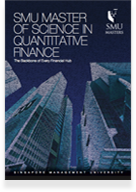
Quants have long been regarded as "the rocket scientists of finance". Whizzes in employing a blend of mathematical modelling, computing skills and finance, experts in quantitative finance (QF) are usually highly sought after by financial firms and institutions to price and trade securities. The use of quantitative models has become almost ubiquitous in detecting lucrative financial opportunities in the market. With the rise in the adoption of data analytics and machine learning in the industry, practically every money management analyst today uses some form of QF in their arsenal of tools.
However, 2020 was a shaky year for the industry, with experts noting that the mining of historical data in developing quant strategies fall short in the face of crises such as the onset of Covid-19.
"Covid-19 has fast-tracked the rapid adoption of technological innovations, particularly in terms of the usage of cloud computing," notes Adjunct Faculty Harry Lo.
"Covid-19 is an unprecedented event. Most datasets that were used to calibrate a model would not capture such market movement. On the methodologies side, researchers have been working to address those weaknesses for many years before Covid-19, including applications of machine learning techniques."
As Benjamin Ee, Adjunct Faculty and a partner at Lucent Investment Associates (a MAS regulated fund manager), adds: "In the specific area of quantitative finance, I feel our students are currently in the privileged position of having all possibilities open to them. I think they should explore this as much as possible."
We speak with Harry, FX Trader at UOB Bank, and Benjamin about QF remaining more relevant than ever, even amid crisis, and the latest quantitative finance trends and exciting job opportunities.


Professors Benjamin Ee (L) and Harry Lo (R)
The next-gen of QF
While the pandemic has undoubtedly rocked the realm of finance, with critics highlighting gaps in QF strategies when faced with an event as devastating as Covid-19, Harry says that ultimately QF leverages a calibrated mathematical model to a set of data to forecast predictions. The quality of the projections is only as good as the quality of the data and the underlying assumptions of the mathematical models.
As Benjamin adds: "Despite several decades of research, quantitative investing is not a 'solved' problem. Using only data from the last 18 months, an immediate hypothesis is: more can be done to ensure consistency across market regimes. More research and more researchers may be needed."
Fortunately, the growth of quantitative strategies is also correlated to access to a high volume of good quality data. In recent years, the dramatically reduced cost of accessing, storing and cleaning data — the process of removing or rectifying incorrect or corrupted data — provides opportunities for developing even more powerful quant strategies, explains Harry. Furthermore, the rise of the usage of alternative data like Twitter feeds to monitor sentiment has deepened the extent of qualitative analysis.
As such, Benjamin notes that following Covid-driven volatility in March 2020, the systematic equities space experienced a bounce-back for the rest of the year as well as in 2021. As of mid-May 2021, Goldman Sachs estimates quantitative equities strategies were up more than 11% YTD (on average), adds Benjamin, making it one of the better performing categories for 2021.
Moreover, there has been a rise in major hedge fund houses planning to relocate to Singapore in 2021 and 2022, which spells a hiring boom in fund management expertise.
"This may be a feature of our stable regulatory regime, reasonable tax rates, and industry support provided by the government like grants," shares Benjamin.
"Students will be well placed to benefit from this."
Building a new wave of quants
Beyond more traditional roles as traders and fund managers, being well-versed in quantitative finance opens the doors to myriad opportunities — some of which are only just coming into existence.
Rather than being pigeonholed within the "sell side" — that is, the industry and personnel like investment bankers and rates traders responsible for the creation of various financial instruments, rather than the "buy side" — like a quant equity portfolio manager for firms that purchase these financial products, Benjamin explains that grads with QF competencies have access to a variety of career pathways.
"They own the 'optionality' associated with all of those possible careers right now," says Benjamin.
"To benefit from this, I think they can (among other things) find out as much as possible about the many different paths available by networking (alumni are an awesome resource), reading widely, especially outside their immediate interest, and even looking for classes at SMU that expand their repertoire."
Similarly, Harry observes an uptick in recruiting quants across banks, hedge funds, high-frequency trading firms and even cryptocurrency firms. In particular, the recent development of new technologies and theories has led to the evolution of quant roles. For example, quant candidates with solid programming skills and experience applying machine learning tools to their strategies are highly sought after.
While students naturally specialise in specific areas as they gain expertise and experience, Benjamin suggests that they maximise this 'optionality' for the long term by acquiring skills which "generalise easily". To enhance their quant capabilities, they may opt to build a foundation in working with statistics, programming and data manipulation that could be relevant to commercial, academic or personal endeavours.
The skillset derived from quantitative finance is also highly relevant to many non-traditional areas like fintech and the growth of digital banking, with the Singapore government recently granting digital banking licenses to several local entities. The public finance policy in Singapore is also placing greater emphasis on green finance, with exciting opportunities in carbon pricing, emissions trade-offs, and other areas of sustainability investments, which could lead to emerging pathways for quants.
As Harry explains: It is not just about applying the latest machine learning model to the biggest data set. Domain-specific knowledge is still the most critical component in most quant strategies."
Speak to our Admissions Advisors
Lee Kong Chian School of Business
Postgraduate Admissions
Singapore Management University
Lee Kong Chian School of Business
Graduate Programmes Office, Level 4
50 Stamford Road, Singapore 178899
Tel: +65 6828 0882
Join us at the upcoming events
Ofukacho, 1−1 ヨドバシ梅田タワ
Osaka, Kita Ward, 〒530-0011, Japan
Kyobashi, 1 Chome−3−5 三井ガーデンホテル 1F
Chuo City, Tokyo, 〒104-0031, Japan
Lee Kong Chian School of Business
Level 4, Postgraduate Office
50 Stamford Road
Singapore 178899
We will be sending the zoom link 2 hours before the start of the event.
You are required to download the Zoom app & sign
